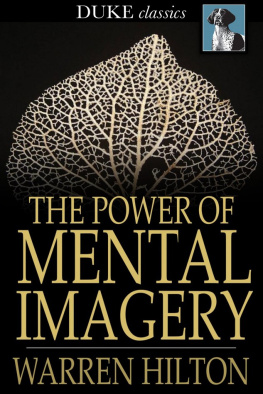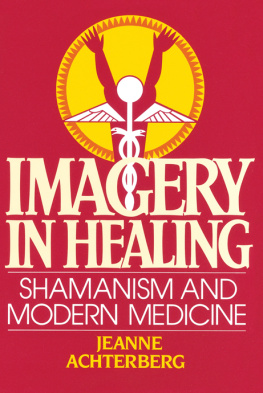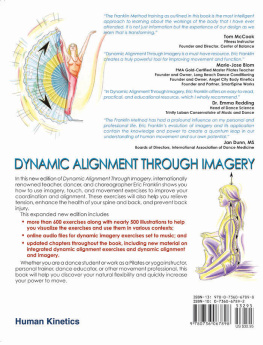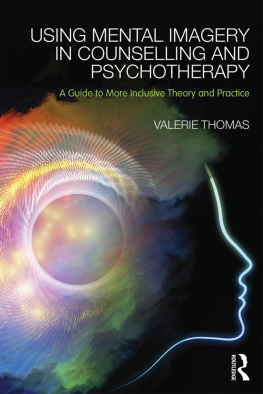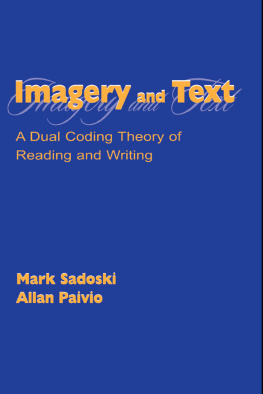THE POWER OF MENTAL IMAGERY
* * *
WARREN HILTON
*
The Power of Mental Imagery
First published in 1914
ISBN 978-1-62011-561-9
Duke Classics
2012 Duke Classics and its licensors. All rights reserved.
While every effort has been used to ensure the accuracy and reliability of the information contained in this edition, Duke Classics does not assume liability or responsibility for any errors or omissions in this book. Duke Classics does not accept responsibility for loss suffered as a result of reliance upon the accuracy or currency of information contained in this book.
Contents
*
*
Being the Fifth of a Series ofTwelve Volumes on the Applicationsof Psychology to the Problems ofPersonal and BusinessEfficiency
BY
WARREN HILTON, A.B., L.L.B.
FOUNDER OF THE SOCIETY OF APPLIED PSYCHOLOGY
ISSUED UNDER THE AUSPICES OFTHE LITERARY DIGESTFORThe Society of Applied PsychologyNEW YORK AND LONDON1920
COPYRIGHT 1914BY THE APPLIED PSYCHOLOGY PRESSSAN FRANCISCO
Chapter I - Imagination and Recognition
*
Recognizing the Past as Past
In the preceding volume of this Course, entitled "The TrainedMemory," you learned that the memory process involves fourelements, Retention, Recall, Recognition and Imagination; and thescope and operation of two of these elements, Retention andRecall, were explained to you.
There remain Recognition and Imagination, which we shall make thesubject of this book. We shall treat of them, however, not onlyas parts of the memory process, but also as distinct operations,with an individual significance and value.
Both Recognition and Imagination have to do with mental images.
Recognition relates exclusively to those mental images that arethe replica of former experiences. It is the faculty of the mindby which we recognize remembered experiences as a part of our ownpast. If it were not for this sense of familiarity and ofownership and of the past tense of recalled mental images, therewould be no way for us to distinguish the sense-perceptions ofthe past from those of the present.
Recognition is therefore an element of vital necessity to everyact of memory.
Imagination, Past, Present and Future
Imagination relates either to the past, the present or thefuture. On the one hand, it is the outright re-imagery in themind's eye of past experiences. On the other hand, it is thecreation of new and original mental images or visions by therecombination of old experiential elements.
Chapter II - Kinds of Mental Images
*
Visual Imagery
When we speak of "images" in connection with Imagination andRecognition we do not refer merely to mental pictures of thingsseen. Mental images are representations of past mentalexperiences of any and every kind. They include past sensationsof sound, taste, smell, feeling, pain, motion and the othersenses, as well as sensations of sight. One may have a mentalimage of the voice of a friend, of the perfume of a flower, justas he may have mental images of their appearance to the eye.Indeed, the term "image" is perhaps unfortunately used in thisway, since it must be made to include not only mental pictures ina visual sense, but all forms of reproductive mental activity.
Our recollection of past experiences may be either full anddistinct or hazy and inadequate. Some persons are entirely unableto reproduce certain kinds of sensory experiences. Somehow theyare aware of having had these experiences, but they cannotreproduce them. Every one of us has his own peculiarities.
Auditory Imagery
This morning I called upon a friend in his office. I was therebut a short time. Yet I can easily call to mind every detailof the surroundings. I can see the exterior of the building,its form, size, color, window-boxes with flowers, red tileroof, formal gardens in the open court, and even many of theneighboring buildings. I can plainly recall the color of thecarpet on his office floor, the general tone of the paper on thewall, the size, type and material of his desk, and many otherelements going to make up an almost perfect mental duplicate ofthe scene itself. I can even see my friend sitting at his desk,and can distinctly remember the color, cut and texture of hisclothing and just how he looked when he smiled.
Imagery of Taste and Smell
Last evening we entertained a number of friends at dinner. One ofthe ladies was an accomplished musician, and later in theevening she delighted us with her exquisite playing upon thepiano. The airs she played were familiar to me. I am fond ofmusic and I enjoyed her playing. I can sit here today and inimagination I can see her seated before the piano and rememberjust how her hands looked as she fingered the keys. But I find itdifficult to recall the air of the selection or the tones of thepiano. My mental images of the notes as they came from the pianoare faint and uncertain and not nearly so distinct and clear asmy recollection of the scene.
Muscular and Tactual Imagery
I find it easy to recall the appearance of the food that wasserved me for breakfast this morning. I can also faintly imaginethe odor and taste of the coffee and toast, but I find that theseimages of taste and smell are not nearly so realistic as mymental images of what I saw and heard during the course of themeal.
When I was in college I was very fond of handball and was amember of the handball team. It has been many years since Iplayed the game, yet I can distinctly feel the peculiar tensionof the right arm and shoulder muscles that accompanied the"service." Nor do I feel the slightest difficulty in evoking adistinct mental image of the prickly sensations that so annoyedme as a boy when I would first put on woolen underwear in thefall of the year.
Personal Differences in Mental Imagery
From these examples, it is apparent that we can form mentalimages of past sensations of sight, sound, taste, smell andfeeling, and indeed of every kind, including the muscular ormotor sense and the sense of heat and cold.
But there is the greatest possible difference in individuals inthis respect. Some persons have distinct images of things theyhave seen, are good visualizers. Others are weak in this respect,but have clear auditory images. And so as to all the variouskinds of sensory images.
This is a fact of comparatively recent discovery. The firstproponent of the idea was Fechner, but no statistical work wasdone in this line until Galton entered the field, in 1880. Inhis "Inquiries into Human Faculties," he says:
Investigations of Doctor Galton
"To my astonishment, I found that the great majority of the menof science to whom I first applied protested that mental imagerywas unknown to them, and they looked on me as fanciful andfantastic in supposing that the words 'mental imagery' reallyexpressed what I believed everybody supposed them to mean. Theyhad no more notion of its true nature than a color-blind man, whohas not discerned his defect, has of the nature of color. Theyhad a mental deficiency of which they were unaware and naturallyenough supposed that those who affirmed they possessed it wereromancing."
Investigations of Professor James
The investigations of Dr. Galton were continued by ProfessorJames, of Harvard University. He collected from hundreds ofpersons descriptions of their own mental images. The followingare extracts from two cases of distinctly different types. Theone who is a good visualizer says:

